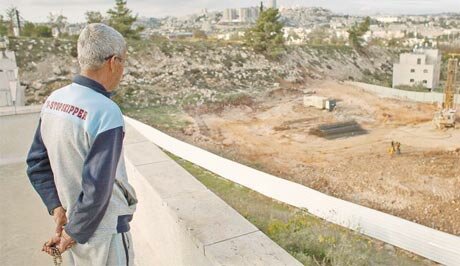New Jerusalem highway to cut Arab neighborhood in half
 Sunday, December 23, 2012 at 05:01PM
Sunday, December 23, 2012 at 05:01PM 
Beit Safafa resident observing highway construction
Construction of highway through Beit Safafa is based on plans drawn up 22 years ago, although no detailed plan for the road was submitted and no permits for the bridges above it were issued, according to municipal officials
The Jerusalem municipality is constructing a highway running through the Arab neighborhood of Beit Safafa, cutting the pastoral area in the south of the city into two.
The road, passing mere meters away from residents’ homes, will not only ruin their quality of life but will cut many of them off from the mosque, bakery, nursery school and other facilities located a few minutes’ walk away. They will now have to travel a long way via roads, underpasses and bridges to get to the other side of the village.
The highway’s construction is based on plans drawn up 22 years ago, although no detailed plan for the road was submitted and no permits for the bridges above it were issued, according to municipal officials.
The village residents will not benefit from the new road, whose main beneficiaries will be West Bank settlers from Gush Etzion who will be able to drive to Jerusalem’s center or Tel Aviv without stopping at a single traffic light.
Ten days ago Attorney Kais Nasser filed an administrative petition against the municipality and its Moriah development company, demanding to halt the construction work and replan the road. Since he filed the petition the residents say the construction has speeded up.
The road is being built on the basis of a plan from 1990, when the city confiscated the residents’ lands for this purpose. But two later master plans for the Jerusalem district stipulated the city must submit detailed plans to build the road before beginning construction. A detailed plan was made for the road section near the Malha mall and the Gilo neighborhood, but no such plan was submitted for the section going through Beit Safafa.
Consequently, the people whose lives will be forever changed by the new road were not given a chance to submit objections or demand compensation.
The construction in Beit Safafa began although the confiscation process of the lands on which the road is to pass has not been completed, and before building permits have been issued for the bridges. The city maintains the road’s construction was approved in 1990. But since then the city issued building permits to houses built very close to the planned route in violation of planning regulations requiring to remove homes from roads of this size.
Alla Salman, who lives meters away from the planned road says since the petition against the road was filed, the construction in the neighborhood has accelerated. About 50 trucks carrying earth enter and leave the village daily, he says.
The work continues until 7 P.M., forcing people living near the site to suffer constant noise and dust.
All the trees in the small orchard in Salman’s yard will have to be cut and a few meters from his balcony the city plans to build an eight-meter acoustic wall, which the city says is a “concession” to the residents.
Mohamed Salman, the family’s father, aged 77, will no longer be able to walk to the mosque or bakery a few minutes’ walk away, and the neighborhood’s small children will have to walk hundreds of yards further and cross a bridge to get to their nursery school.
“There’ll be a separation wall like in the West Bank, in the middle of Beit Safafa,” says Ala Salman. “It’s a great injustice.”
The city responded that the road is a major project with “a high economic value.” It said the residents will benefit from the road and be able to enter it at either intersection on the village outskirts.
------------------------------------------------------------------------------------------------------------
 APJP |
APJP |  Post a Comment |
Post a Comment |